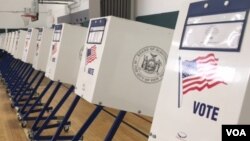Virginia's governor signed an executive order Friday that restores voting rights to more than 200,000 convicted felons.
Virginia, like most other U.S. states, has passed laws that restrict the rights of people convicted of committing felony offenses.
But instead of pushing legislators to change the Civil War-era law, Governor Terry McAuliffe claims he has the executive authority to overturn it on his own, and Friday restored voting rights to both violent and non-violent offenders.
The order is effective immediately and applies to "any felon who has completed any term of incarceration and completed any period of supervised release, probation or parole, for any and all felony convictions."
He and his supporters say the action eliminates a measure that was originally aimed at disenfranchising African-Americans.
His opponents point to the fact that the action will boost the rolls of likely Democratic voters for this November's presidential election, and say his motives are purely political.
"The singular purpose of Terry McAuliffe's governorship is to elect Hillary Clinton president of the United States," Virginia's Republican House Speaker William J. Howell said in a statement.
Remedying injustice?
Others took aim at a measure they criticized as overly broad.
“Gov. McAuliffe could easily have excluded those who have committed heinous acts of violence from this order, yet he chose not to," said Republican Party of Virginia chairman John Whitbeck. "His decision to issue a blanket restoration, without regard to the nature of the crimes committed, doesn't speak of mercy."
McAuliffe, however, calls the executive action a way to remedy voting rights injustices to African-Americans.
Felons who are covered must still register to vote, and voting rights advocates are expected to begin visiting communities to start registering people.
Tram Nguyen, executive director of the New Virginia Majority, told the New York Times that the order was a "huge deal."
"We talk about needing to raise up your voice so that we can impact policymakers, and these people are saying to us, ‘We don't have a voice, no one is going to listen to us, we don't even have our right to vote,'" Nguyen said.
The governor said he wants people who have served prison time and served probation "back in society."
"I want you feeling good about yourself. I want you voting, getting a job, paying taxes. I'm not giving people their gun rights back and other things like that. I'm merely allowing you to feel good about yourself again, to feel like you are a member of society," McAuliffe said.






